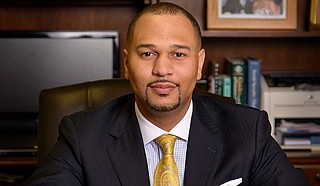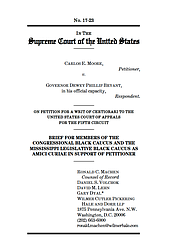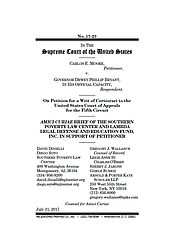Monday, August 7, 2017
Mississippi attorney Carlos Moore asked the U.S. Supreme Court to hear his case against Gov. Phil Bryant to take down the state flag, and now black lawmakers in Mississippi and Washington, D.C., are backing him up. Photo courtesy Carlos Moore
JACKSON — Members of the Congressional Black Caucus, including civil-rights leader Rep. John Lewis, D-Ga., and the Mississippi Legislative Black Caucus have asked the U.S. Supreme Court to hear Mississippi attorney Carlos Moore's state flag case.
Moore sued Gov. Phil Bryant in 2016, challenging the constitutionality of Mississippi's state flag, which contains a Confederate battle flag in its canton. The lower court as well as the 5th U.S. Circuit Court of Appeals blocked Moore's case, saying the lawyer did not have standing, so he appealed to the U.S. Supreme Court in June.
Members of black caucuses in Washington, D.C., and Mississippi alike are asking the high court to hear the case.
"Petitioner Carlos Moore has alleged that the state (adopted the state flag) in order to inform all that its newly freed black citizens—and generations of their descendants, including Mr. Moore—would continue to be second-class citizens," the amicus brief from caucus members says. "The state continues to force this message on Mr. Moore and his family today, where they live, work and learn."
The caucus members' brief says questions Moore presents in his case are important because the Confederate battle flag "is a divisive and harmful symbol of racism that some governments nonetheless continue to embrace."
They argue that Moore has standing to challenge the state flag's constitutionality because he is not merely a "concerned bystander."
"(Mr. Moore) is a Mississippi citizen attempting to take equal part in public life in a state that has adopted as its official symbol a statement of his racial inferiority," the brief says. "Mr. Moore's claim arises not from a generalized theory of stigmatic injury resulting from discrimination against other members of Mr. Moore's minority group, but from the direct effect of the state's discriminatory speech on him and his family."
Caucus members argue that the lower court's conclusions about Moore's standing ignored the nature of the discriminatory speech the state flag has on him.
"Ending government endorsements of racism is essential to our nation's continued progress toward ending racism itself. This Court should grant certiorari to reaffirm the Constitution's protections against state-sponsored messages asserting the second-class status of a race," the brief says.
The Southern Poverty Law Center and Lambda Legal also filed a brief urging the U.S. Supreme Court to grant Moore's writ of certiorari, which is the motion he filed asking the high court to hear the case. The legal organizations' brief centers around the history of the Confederate battle flag and its use in the South by white -supremacist groups, tracing it to modern-day research that shows that racial attitudes are a major factor in determining an individual's support or opposition for the Confederate flag.
"The psychological harm caused by racism—'greater when it has the sanction of the law'—has been acknowledged by this Court for more than sixty years," the brief says.
SPLC and Lambda Legal lawyers argue that the high court needs to consider the connection between discrimination and psychological harm to African Americans, which Moore argues in his lawsuit.
"In considering whether Petitioner has standing, the court below failed to recognize the distinctive harm to African-Americans and other minorities caused by such a state-endorsed message of racism," the brief says. "The question of whether Petitioner has standing under these circumstances to challenge the Mississippi state flag under the Equal Protection Clause is an important one that should be reviewed by the Court."
The state has not filed any briefs with the U.S. Supreme Court, and under the court's rules, the state can wait to see if any member of the court believes Moore's petition warrants a response before filing one. Supreme Court justices could take up Moore's petition in their conference scheduled for Sept. 25.
Email state reporter Arielle Dreher at [email protected] and follow her on Twitter at @arielle_amara.


